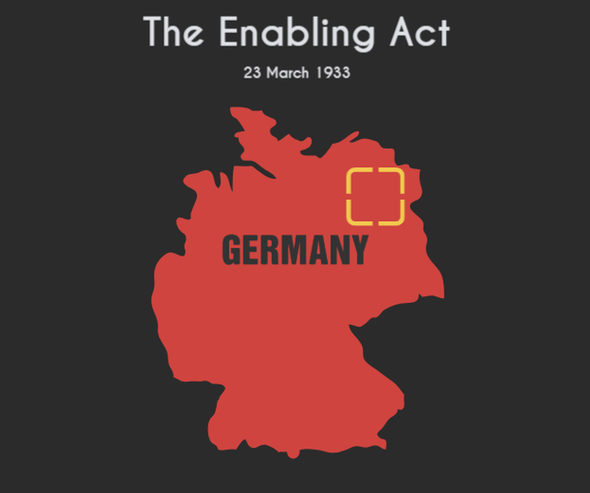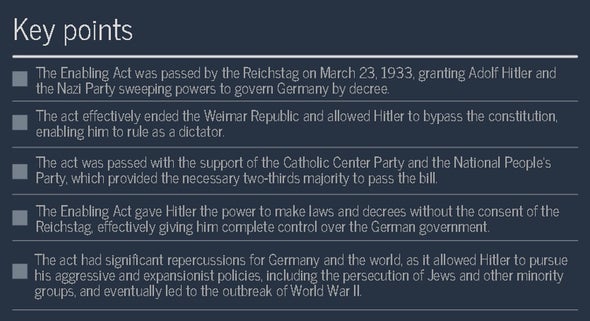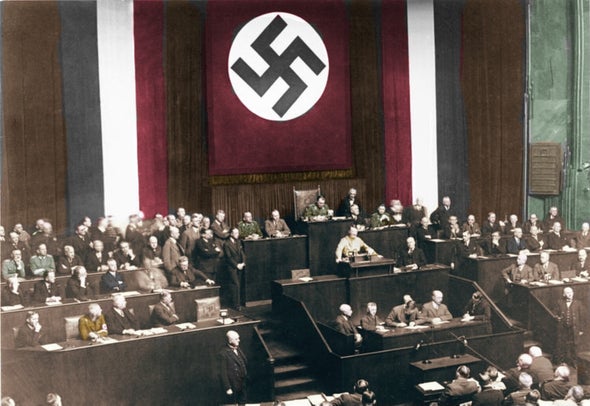Hitler tightens his hold
The Enabling Act of 1933 was a law passed by the German Reichstag on the 23rd March 1933, that gave Chancellor Adolf Hitler and his government sweeping powers to enact legislation without the consent of the Reichstag.
The act was passed in response to the burning of the Reichstag building (The Reichstag building houses the German parliament), which was set on fire on 27th February 1933 and was in turn, used as a pretext for the government to assert that the country was in a state of emergency and that the act was necessary to restore order.
Reichstag fire and decree
The Enabling Act was the result of a series of events that took place in the early months of 1933. The Nazi Party had been elected to power in January of that year and immediately began to exert control over the German government.
Hitler and his advisors saw the Reichstag fire as an opportunity to solidify their hold on power and move towards a dictatorship.
Hitler immediately blamed the fire on communists and claimed the arson was part of a larger plot to destabilise the German government.
Hitler used this justification to persuade Hindenburg to pass the Reichstag Fire Decree. Most civil liberties were abolished by the decree, including the right to speak, assemble, protest, and receive due process.
The Nazis used the decree to declare a state of emergency and launch a violent crackdown on their political opponents.
The Reichstag Fire on 1933.
Four Pulitzer-winning takes on the rise of Adolf Hitler - The Pulitzer Prizes
As Hitler cleared the political arena of anyone who dared to oppose him, he claimed that the decree was insufficient and that sweeping policies were needed to protect his emerging dictatorship. Hitler presented a proposal to the Reichstag that, if passed, would immediately grant the cabinet, and thus Hitler, all legislative powers. This effectively allows Hitler's government to act without regard for the constitution.
Enabling act
Despite outlawing communists and repressing other opponents, the Enabling Act was not a sure thing. Hitler allied with other nationalist and conservative factions, and they steamrolled the Social Democrats in the German federal election on 5th March 1933.
German voters were subjected to extreme voter intimidation by the Nazi Sturmabteilung (SA) militia. Contrary to popular belief, Hitler did not win a landslide victory in the Reichstag because the majority of Germans did not vote for the Nazi Party.
The Enabling Act was introduced to the Reichstag on 23rd March 1933 and was passed with the support of the Nazi Party and the German National People's Party. The act effectively gave
Hitler and his government the power to pass laws without the consent of the Reichstag and to govern by decree. The act also provided that the government could make changes to the constitution, as long as they were in line with the principles of the National Socialist movement.
Members of the Sturmabteilung (SA). Acting as Hitler's uniformed thugs, they were used to intimidate voters.
The Enabling Act gave Chancellor Adolf Hitler and his government sweeping powers to enact legislation without the consent of the Reichstag. The key policies of the act were:
- Abolition of the parliamentary system: The Enabling Act effectively abolished the parliamentary system and gave Hitler and his government the ability to act without any constraints or checks on their power.
- Powers to enact legislation without the consent of the Reichstag: The act gave Hitler and his government the power to pass laws without the consent of the Reichstag, effectively giving them complete control over the legislative process.
- Ability to govern by decree: The act provided that the government could make changes to the constitution, as long as they were in line with the principles of the National Socialist movement and allowed the government to govern by decree.
- Empowerment of the government: The Enabling Act gave Hitler and his government sweeping powers to take control of the country and to make decisions that impacted the lives of millions of Germans.
- Consolidation of power: The act was a critical step in the consolidation of Hitler's power and the establishment of the Nazi dictatorship in Germany, and it paved the way for the implementation of many of the policies that would come to define the Nazi regime.
Hitler's Reichstag speech promoting the bill was delivered at the Kroll Opera House, following the Reichstag fire.
File:Bundesarchiv Bild 102-14439, Rede Adolf Hitlers zum Ermächtigungsgesetz.jpg - Wikimedia Commons
Consolidation of power
The Enabling Act was a significant moment in the consolidation of Hitler's power and the establishment of the Nazi dictatorship in Germany.
The act effectively abolished the parliamentary system and gave Hitler and his government the ability to act without any constraints or checks on their power.
The act was a key step towards the establishment of a totalitarian state in Germany, and it paved the way for the implementation of many of the policies that would come to define the Nazi regime.
Hitler speaking at a rally on 1st March 1938.
Effects of the act
The Enabling Act had far-reaching consequences for the German people and for Europe as a whole.
The act gave Hitler and the Nazi Party the ability to pass laws and make decisions that impacted the lives of millions of Germans, including the persecution of Jews, political dissidents, and other minority groups.
The act also led to the establishment of concentration camps, the implementation of the policy of eugenics, and the beginning of the Holocaust.
These laws were able to deviate from the Constitution (with certain exceptions). The Act effectively rendered the Reichstag inactive in German politics. While its existence was protected by the Enabling Act, it effectively reduced the Reichstag to a stage for Hitler's speeches. It only met infrequently until the end of WWII, held no debates, and passed only a few laws.
Dachau concentration camp in 1933. The passing of the Enabling Act allowed the Nazi's to establish the notorious concentration camps.
Vintage Everyday
Images of Dachau reveal the nascent Nazi death machine -- in color | The Times of Israel
Within three months of the Enabling Act's passage, all parties except the Nazi Party were banned or forced to dissolve, and on 14th July, a law was passed that made the Nazi Party the only legally permitted party in the country.
Though the Act formally granted the government as a whole legislative powers, these powers were effectively exercised by Hitler himself. Following its passage, there were no longer any serious discussions in Cabinet meetings. After 1934, its meetings became increasingly infrequent, and it never met in full again after 1938.
Because Hitler took great care to give his dictatorship the appearance of legality, the Enabling Act was renewed twice, in 1937 and 1941. However, because all other parties were banned, its renewal was practically guaranteed. Under far-from-secret conditions, voters were presented with a single list of Nazis and Nazi-approved "guest" candidates.
The Reichstag passed a law in 1942 that gave Hitler power over every citizen, effectively extending the provisions of the Enabling Act for the duration of the war.
Conclusion
In conclusion, the Enabling Act of 1933 was a critical moment in the establishment of the Nazi dictatorship in Germany. The act gave Hitler and his government sweeping powers to pass laws and govern without any constraints, and it paved the way for the implementation of many of the policies that defined the Nazi regime.
The act was a key step towards the establishment of a totalitarian state in Germany, and it had far-reaching consequences for the German people and for Europe as a whole.
Pages 1 and 2 of the enabling act with signatures.
Public domain
Further reading
Sources:
Enabling Act of 1933 - Wikipedia
https://ronaldwederfoort.wordpress.com/2016/05/22/did-hitler-live-to-old-age-here-in-argentina/
https://www.pulitzer.org/article/four-pulitzer-winning-takes-rise-adolf-hitler
http://www.hitlerpages.com/pagina37.html
https://www.timesofisrael.com/images-of-dachau-reveal-the-nascent-nazi-death-machine-in-color/
https://brewminate.com/sturmabteilung-hitlers-original-paramilitary-wing-the-brownshirts/
Richard J. Evans, The Coming of the Third Reich.
Ian Kershaw, Hitler: 1889-1936
Michael Burleigh, The Third Reich: A New History.
















